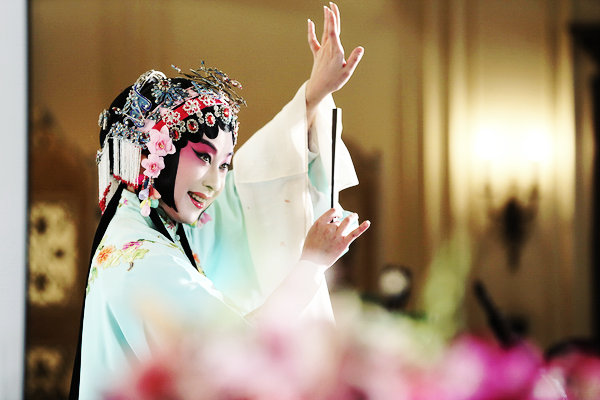 |
|
[Photo provided to China Daily] |
The project has brought together generations of Kunqu Opera artists-from Liang and fellow artists in their 70s to younger talent.
Artists such as Shen Yili and Li An, who will be performing The Purple Hairpin, another operatic piece, are in the "golden years" of their artistic careers, says Yue Meiti, an artist in her 70s.
Of Tang's Four Dreams, Peony Pavilion is the best documented and most performed.
Reviving the other three plays-A Dream under the Southern Bough, The Handan Dream and The Purple Hairpin-took a great deal of effort by the Shanghai Kunqu Opera Troupe.
Tang was a contemporary of William Shakespeare.
So, as China marks the 400th anniversary of Shakespeare's death, along with the rest of the world, cultural experts here are grumbling that less attention is being paid to Tang.
As Zhang Haiyan, a reporter covering the Shakespearean events in Shanghai, asks: "Why is Tang Xianzu often described as 'China's Shakespeare' and never the other way round?"
His question gets its answer in the views of Zhang Xiaoding, general manager of Shanghai Grand Theater, who says: "It has to do with the dominance of English culture internationally. China's arts sector has a lot to do in order to catch up and introduce our own cultural treasures to the rest of the world."
The Shanghai Kunqu Opera Troupe's endeavor is a major step to introduce Tang's masterpieces to the public.
"We are the only Kunqu Opera troupe in China to produce the whole series of Four Dreams," Gu says.
Kunqu is the oldest among hundreds of folk operas in China.
For almost 300 years, Kunqu Opera, known for its grace, beauty and delicacy, dominated the country's theater scene, until Peking Opera, which shares common roots with Kunqu and combines influences from a variety of folk music and theatrical arts, took over in the late 1800s.
Tang's plays are still widely adapted today for different folk opera styles in China, yet Peony Pavilion, which remains the best known of them, is mostly staged in Kunqu.
The story is about a love that straddles life and death.
Liu Mengmei, a poor young scholar, and Du Liniang, the daughter of a high-ranking official, share the dream of meeting and falling in love under a tree, despite the fact that they've never met. Tormented by this unfulfilled love, Du fades away, and before her death asks a helper to hide one of her portraits in a garden.
Years later, Liu passes by the same garden, and finds Du's portrait. He immediately recognizes the woman, and eventually digs her out of her grave, reviving and marrying her.
Contact the writer at zhangkun@chinadaily.com.cn
If you go
Peony Pavilion
7:30 pm, April 24, Shanghai Oriental Art Center. 425 Dingxiang Road, Pudong district, Shanghai. 021-6854-1234.
Four Dreams in the Camellia Hall
7:30 pm, June 3-6, Guangzhou Grand Theater. 1 Zhujiang Road West, Zhujiang New Town, Tianhe district, Guangzhou. 020-3839-2666.
7:30 pm, July 16-19, National Center for the Performing Arts. No 2, West Chang'an Avenue, Xicheng district, Beijing. 010-6655-0000. 7:30 pm, Dec 1-4, Shanghai Dramatic Arts Center. 288 Anfu Road, Xuhui district, Shanghai. 021-6473-0123.